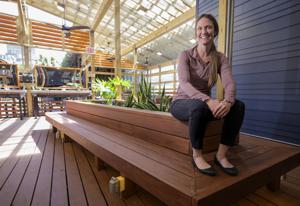Emily Wain, executive director of the Harry Tompson Center, is pictured at the center in New Orleans on Thursday, March 20, 2025. (Staff photo by Brett Duke, The Times-Picayune) Facebook Twitter WhatsApp SMS Email Print Copy article link Save Like many cities, New Orleans has struggled to address its homelessness crisis in a way that is both compassionate and effective. While there are no easy solutions, a day shelter on the edge of the Central Business District, the Harry Tompson Center, is showing the way, providing its “guests” with clean showers, private bathrooms, device charging stations and other vital services to help them find a permanent home.
Over the past few years, the Harry Tompson Center has helped about 150 individuals a year, on average, qualify for housing — a monthslong process that involves assessment, handholding, paperwork, medical screenings and behavioral health counseling. The center helps hundreds more each year ready themselves for that process. But that's just a fraction of the more than 17,000 mostly men and some women who avail themselves of the center's hygiene services.

The Harry Tompson Center sees hygiene as a gateway to greater care, so the real way to measure its effectiveness is by the number of folks who go there to take a shower. "If you are standing around waiting for a shower, one of our housing case navigators can come around and talk to you and begin to have that initial conversation," said Paisleigh Kelley, the center's communications director. "It opens the door.
" Now, the Harry Tompson Center is opening that door even wider with an expanded facility that will make hygiene services more accessible — and, staffers hope, more enjoyable — thereby enabling the organization to serve more people. In early March, the center cut the ribbon on an expanded hygiene area with 10 showers, six private bathrooms and twice as many sinks as before, 18 in all, with hot water. The new space also has a laundry facility, where a staffer will wash guests' clothes, and a larger, better-lit common area.
Showers are seen at the Harry Tompson Center in New Orleans on Thursday, March 20, 2025. (Staff photo by Brett Duke, The Times-Picayune) The facility is not only more spacious but also more functional. “It’s a better utilization of space that is beautiful and will help us better fulfill our mission,” said the center's Executive Director Emily Wain.
The $2.1 million project marked the first phase of a total $3.6 million overhaul of the center.
Phase two, now underway, includes the build-out of three medical treatment rooms, four counseling/case management rooms, three private phone booths and new administrative offices. The new space is scheduled to be completed in late fall. “This will enable us to really kick things up a notch and do an even better job for those we serve,” said Wain.
"We're hoping to expand our medical services from two days a week to five." Beautiful collaboration The Harry Tompson Center was founded in the late 1990s by the late Rev. Harry Tompson, a popular Jesuit pastor and high school administrator in New Orleans, who also founded Café Reconcile and The Good Shepherd School.
Fr. Harry Tompson at the lectern in March, 2001. His gifts included an ability to deliver short, poignant sermons that 'cut right through to the soul.
' It began when Tompson started offering snacks and other assistance to needy people at the community center building next to his church, Immaculate Conception on Baronne Street. After Tompson's death in 2001, volunteers took over the organization and officially incorporated it as a 501(c)3 a few years later. In 2007, as the city began rebuilding after Katrina, the center moved to its present location in the parking lot behind St.
Joseph’s Catholic Church on Tulane Avenue. It partnered with the pastor of St. Joseph's and with Lantern Light Ministries, another local nonprofit that serves the homeless, to create what is known as Rebuild.
In the nearly two decades since, Rebuild has evolved into a partnership of four organizations, each working independently yet collaboratively to care for the homeless and needy in distinct and complementary ways. The Harry Tompson Center provides hygiene and other basic services to help stabilize guests and prepare them for housing. Lantern Light serves breakfast and lunch daily.
It also provides regular mail service and helps people secure state ID cards — two critically important services to those living on the streets and seeking jobs or housing. DePaul USA, which joined Rebuild in 2012, places guests in housing and works to keep them housed, trying to ensure they get the type of support they need once they’ve moved into an apartment. St.
Joseph Catholic Church at 1802 Tulane Ave. St. Joseph’s, the fourth partner in Rebuild, makes the property in its parking lot available for free.
“It’s really a beautiful collaboration,” Wain said. “It’s a partnership in the true sense of the word and we all really work well together, even while staying in our own lanes.” 'In it together' Wain came to New Orleans from St.
Louis in 2004 as a member of the Jesuit Volunteer Corps, a service program for young adults. Her placement as a JV was with the Harry Tompson Center, back when it was operating from the space on Baronne Street. “I thought I would stay a year or two and then figure out what to do with my life,” she said.
Emily Wain, executive director of the Harry Tompson Center, closes shower doors at the center in New Orleans on Thursday, March 20, 2025. (Staff photo by Brett Duke, The Times-Picayune) More than two decades later, she’s firmly entrenched in New Orleans, with a husband and two children, and has built her career at the Harry Tompson Center. In 2020, weeks into the COVID pandemic, she was tapped to succeed longtime executive director, Vicki Judice, who still volunteers at the center and serves on its board.
“It’s hard to capture in words how special this place is,” Wain said. “Even in the hard times, I’m surrounded by amazing people, guests, staff, volunteers. We’re in it together.
” Her days at the center are unpredictable, crazy and rewarding. Of late, she’s been preoccupied with keeping services running as smoothly as possible amid the din of buzz saws and hammers, making sure last-minute glitches — dryers that aren’t heating quite enough, erratic water pressure — are resolved. She also stays busy coordinating with volunteers, some of whom help out once or twice a week in their spare time; others, like Sr.
Kathy Obermann, who come daily to man the charging stations and is indispensable to daily operations. Kip Barard and Sister Kathy Overmann chat at the Harry Tompson Center in New Orleans on Thursday, March 20, 2025. (Staff photo by Brett Duke, The Times-Picayune) When she has time to take a break, she enjoys sitting with guests in the Rebuild courtyard, with its wide benches shaded by lush palm trees and tall bamboo.
“It’s really cool when you share community with people,” she said. “I can’t tell you how many people in the course of a day ask me about my two little boys. They’re not saying it to be polite.
They really care.” Team effort Planning for the Harry Tompson Center’s construction project started more than two years ago and was long overdue, Kelley explained. Rickey Paul washes his hands at the Harry Tompson Center in New Orleans on Thursday, March 20, 2025.
(Staff photo by Brett Duke, The Times-Picayune) “Our center is constructed of modular trailers and wooden decking and was never designed to be permanent,” Kelley said. “Heavy usage, weathering and the wear-and-tear of nearly 18 years of foot traffic were threatening the structural integrity of our facilities.” On top of that, showers and toilets were falling through the floors, creating unsafe and unsanitary conditions, and the center was outgrowing the office space, which it shares with DePaul USA.
In late 2022, the board, led by longtime board president Mary Baudouin, created a capital campaign committee, chaired by CPA Stephen Romig. With help from board members Paul Buras, James Pellerin and others, they began fundraising. They raised the money, hired architects and engineers, secured permits from the city and put the project out to bid.
It broke ground in early 2024 and phase one was completed about a year later. When the new facility opened, guests were amazed and raved about the comfort of the showers and the luxury of having hot running water to shave with in the sinks. "To see the appreciation our guests have for what we offer here is really special," Wain said.
"It's about meeting them where they are and hopefully, many times, leads to something more.".
Business

Growing home: The Harry Tompson is expanding its day shelter for the needy and unhoused

Like many cities, New Orleans has struggled to address its homelessness crisis in a way that is both compassionate and effective.














